Spreading success: Why Australia needs multi-school organisations
Grattan Institute Research
Since its inception, the Fogerty Foundation has recognised the challenges confronting Australia’s – and Western Australia’s – education system. With over 800 schools dispersed across the state, a significant portion, if not all, are struggling to keep pace with the evolving demands of modern education. New research from the Grattan Institute sheds light on these challenges and shows how a different way of organising schools could help each meet the demands of modern education.
This stark reality underscores a fundamental truth: the conventional approach of treating each school as an isolated ‘island’ is no longer viable. Operating individually, these schools lack the collective strength and resources necessary to navigate the complexities of contemporary education. They exist as separate entities, in a sea of challenges, many which are distant from effective collaborative networks or support systems which are enablers for improvement.
In response, a paradigm shift is imperative. Grattan recommends we must move beyond ‘island’ schools and presents the concept of Multi-School Organisations (MSOs) as the answer. An MSO is a concept that aims to improve education outcomes by creating strong networks of schools. Introducing MSOs would help respond to the challenges facing WA’s schools. By uniting clusters of schools under unified leadership structures, MSOs provide the organisational coherence needed to drive meaningful change. They strike a balance between individual autonomy and centralised oversight, fostering collaboration, resource sharing, and collective problem-solving. The Grattan Institute’s research underscores the potential of MSOs as a catalyst for school improvement. By harnessing the collective strength of multiple schools, MSOs can leverage resources more effectively, share best practice, and provide targeted support where it is most needed. This collaborative approach is essential for breaking down barriers to progress and ensuring equitable access to quality education for all students in our state.
Why is this new model worth contemplating? In research done in 2015, a long-standing member of our Board of Trustees, Emeritus Professor Bill Louden AM found that ‘stable, long-term leadership and explicit school improvement plans were aspects which high performing primary schools had in common’. It is hard to find an exceptional leader to stay long-term in every school in the state. MSOs could help. They give new principals a softer landing, and provide a secure leadership base, so positive transformations that begin under one principal are seen through under successive principals.
In 2012 the Fogarty Foundation introduced Fogarty EDvance, a program dedicated to evidence-based professional development for school leadership teams and fostering connections among educators within cohorts. The primary goal was to cultivate a culture of learning and support, where school leaders could glean insights from one another and provide mutual assistance, whilst developing and implementing a comprehensive plan for whole school improvement. By participating in the Program, these groups offer each other a supportive framework wherein they can exchange knowledge, teaching methods, and confront challenges together. Fogarty EDvance, now comprising almost 150 schools from low socio-economic communities, indirectly incorporates many components of the MSO framework, enabling positive transformations – and improved educational outcomes – to be achieved in challenging school contexts.
The Fogarty EDvance School Improvement Program operates on the principle of being driven by the needs and contexts of individual schools and their leaders, ensuring adaptability and relevance. It empowers school leaders to review the evidence of their school’s effectiveness, to pinpoint effective practices and integrate them into their educational settings to address the issues identified, in order of priority. EDvance believes in the transformative power of strong leadership, recognising it as the linchpin for successful whole-school improvement strategies, particularly in fostering high-impact teaching practices. Through professional development and collaborative networks, the Program acts as a catalyst for innovation, collaboration, and greater effectiveness in education.
However, while MSOs offer great promise, they are not an instant remedy. To realise their full potential, MSOs must be supported by robust regulatory frameworks and rigorous evaluation mechanisms. Governments, education authorities, and stakeholders must collaborate to establish mechanisms that hold MSOs fully accountable for their performance and ensure they deliver on their promise of improved outcomes for all students. These efforts should be supported by embedding the common provision of relevant services, allowing teachers and leaders to focus on their core responsibilities at the school site.
The recommendations from the Grattan Institute underscore the importance of trialing Multi-School Organisations (MSOs) across different players in the education system; state, catholic and independent. We support the Grattan recommendation that trials should be led by state and territory governments, with funding and regulatory support from the federal government, as, with all significant reforms, a partnership approach will be needed. By embracing MSOs, Western Australia can nurture greater collaboration, innovation, and excellence, leveraging its high performing schools and leaders, to enhance educational outcomes for all students.
As advocates for a quality education no matter where a child lives in Western Australia, the Fogarty Foundation acknowledges that Australia has a literacy crisis. Given the importance of ensuring every child has the essential skills for success, we recognise the imperative of transforming the way reading is taught in our schools. The recent findings from the Grattan Institute’s report on reading abilities serve as a call for action, reaffirming the need for systemic reform that utilises evidence-based interventions.
At the heart of Australia’s reading problem lies a decades-long debate over pedagogical approaches to teaching reading. The Foundation believes that the time for debate is over. The evidence is clear: the ‘whole-language’ approach, with its reliance on the notion that reading is a natural, unconscious process, falls short of meeting the diverse learning needs of our students.
Instead, we advocate for the widespread adoption of the ‘structured literacy’ approach throughout our education system. Grounded in research and proven effectiveness, structured literacy places a strong emphasis on phonics instruction, decoding skills, and phonemic awareness. By equipping students with the foundational skills to sound out words and decode meaning, structured literacy lays the groundwork for reading success.
However, it is also key to recognise that structured literacy is not merely about phonics; it encompasses a holistic approach to reading instruction. It emphasises vocabulary development, comprehension strategies, and fluency practice, fostering understanding of texts and nurturing a lifelong love for reading. This comprehensive approach ensures that students not only read proficiently but also engage critically with diverse texts across various disciplines.
Grattan argues that, central to its vision for a reading revolution, is the establishment of a ‘Reading Guarantee’ – a six-step commitment to achieving reading proficiency for all Australian students:
- Pledge that at least 90 per cent of Australian students will become proficient readers, setting ambitious yet achievable targets for educational excellence.
- Provide educators with clear guidelines on evidence-based reading instruction, ensuring consistency and effectiveness in teaching practices.
- Equip schools with high-quality curriculum materials and assessments, empowering teachers with the tools they need to deliver effective reading instruction.
- Implement universal screening of students’ reading skills and provide targeted support for those in need, ensuring no child falls through the cracks.
- Invest in teacher professional development and appoint Literacy Instructional Specialists in schools, building educators’ capacity to deliver high-quality reading instruction.
- Mandate a nationally consistent Year 1 Phonics Screening Check and hold schools accountable for their performance in teaching students to read, driving continuous improvement in literacy outcomes.
By implementing evidence-based reading instruction and committing to the Reading Guarantee, significant positive change can be achieved that will benefit generations to come. The Fogarty Foundation supports the findings of the Grattan Institute and welcome the level of public interest in the growing challenge facing our schools and the education sector.
Let’s use this momentum to drive reform, ensuring that every child has the opportunity to unlock their potential through high quality, evidence-based, literacy instruction in West Australia’s schools.
Empowering Tomorrow’s Leaders: Highlights from the InspirED 2023 event by the Fogarty Foundation
On 26 October 2023, the Fogarty Foundation’s annual InspirED event took place. As always, it was a remarkable occasion as it provided a wonderful showcase of the achievements and potential of the University of Western Australia (UWA) Fogarty Scholars. It featured presentations and discussions on a wide array of topics, including entrepreneurial ventures, social impact initiatives, and inspiring personal journeys. The event also highlighted the Foundation’s commitment to nurturing young talent by empowering Scholars to reach their full potential and so make a positive impact on our society.
A major highlight at the InspirED event was hearing the insights of the UWA Fogarty Scholars. These talented young minds seized their Scholarships as a launchpad for personal and academic growth, with the event providing a platform for them to showcase their accomplishments. From Caleb McKenna who has been awarded the prestigious Rhodes Scholarship for Western Australia in 2024; to Nicholas Ellison and Lydia Almeida, new medical graduates who aspire to work in regional, rural and remote medicine; and Luke Osborne whose overseas internships helped him find his passion in mathematical finance and financial technology. The talented Emily Roberts and Racheline Tantular round out our six graduates, Emily with her Master of Professional Engineering (Mech Eng) and Racheline with a Bachelor of Philosophy in Music and Asian Studies.
A compelling narrative was skillfully crafted throughout the evening by Caleb Adams, the event’s MC and Vice President of the Fogarty Scholars Association. In his address to the audience, he urged us to reflect on the idea that each person carries their own unique story, which collectively weaves into the broader narrative of our shared history and culture. He left the audience with a thought-provoking question to ponder throughout the evening: “What kind of legacy do you aspire to leave behind?”
Attendees were inspired by keynote speaker Kyle Hoath, who shared his journey from medicine to entrepreneurship. He began by showcasing the positive impact of his project, Oqea, in the field of mental health. Kyle stressed the importance of teamwork and having a support system. When reflecting on legacy in light of Caleb’s question, Kyle concluded that legacies take time to build, and achievements often unfold in surprising ways.
Guests were also fortunate to connect virtually with Lachie McDonald, a Scholar who is now pursuing postgraduate studies at the Australian National University (ANU) in Canberra, as part of a special scholarship opportunity uniquely for UWA Fogarty Scholars. Lachie shared his insightful reflections on his journey as a Fogarty Scholar, emphasising the critical importance of developing digital skills for the future and driving progress in artificial intelligence. He delved into the philosophical underpinnings of AI which served as a compelling reminder to the audience that the intelligence of digital systems is fundamentally shaped by real-world actions and decisions. Lachie’s message concluded with a resounding call to action, highlighting the urgency of our role as active participants in shaping the future. Here again we were reminded of Caleb’s question; “What kind of legacy do you aspire to leave behind?”.
In a special moment during the event, the Jeremy Cheang Award was presented to Shantelle Jeyakumar for her exceptional achievements and her commitment to making a positive impact on her community. Shantelle won the award for her innovative project centered on an educational platform that integrates dental health, women’s health, and financial literacy. What makes this recognition even more special is that Shantelle will receive mentorship from Dr. Marcus Tan, a leading expert in the field. Shantelle’s work steps toward one legacy that she may leave behind; by leveraging emerging digital tools to create equality of information and access.
Thank you to all who attended the InspirED 2023 event, a photo gallery of which is available here. We also encourage you to investigate Kyle’s Oqea and other Scholars’ initiatives.
The UWA Fogarty Scholars program is one of the Foundation’s flagship programs. This program has been instrumental in identifying, supporting, and nurturing exceptional students from various fields. With 10 selected each year and an alumni of over 120 Scholars, this group represents a diverse range of talents, ambitions, and backgrounds, and an inspiring group to follow. To learn more about our Scholars and alumni, visit them here.
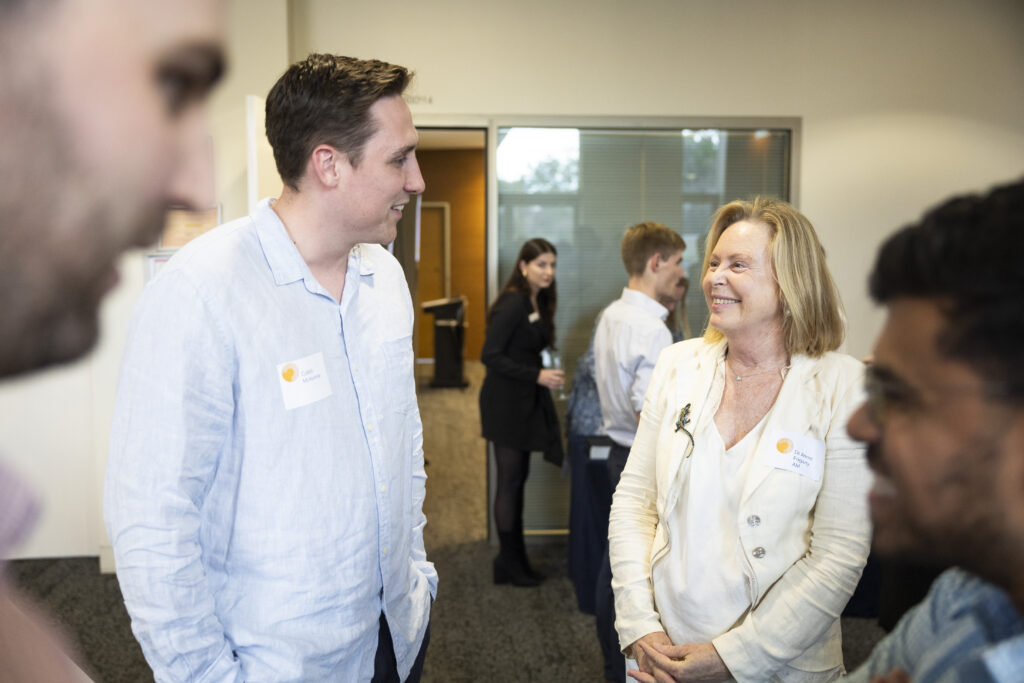
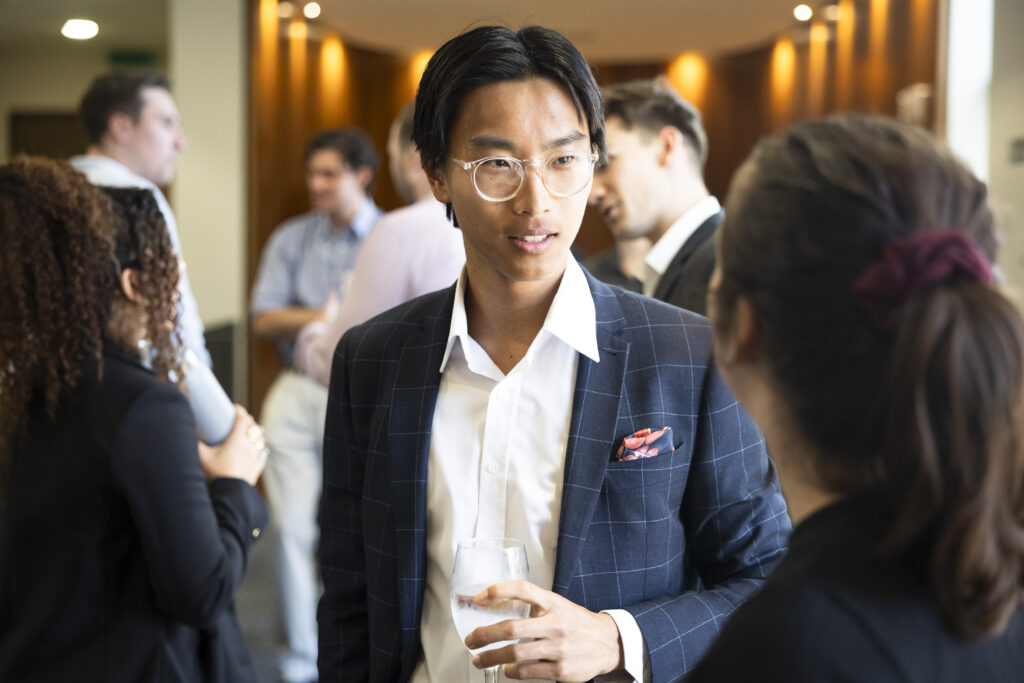
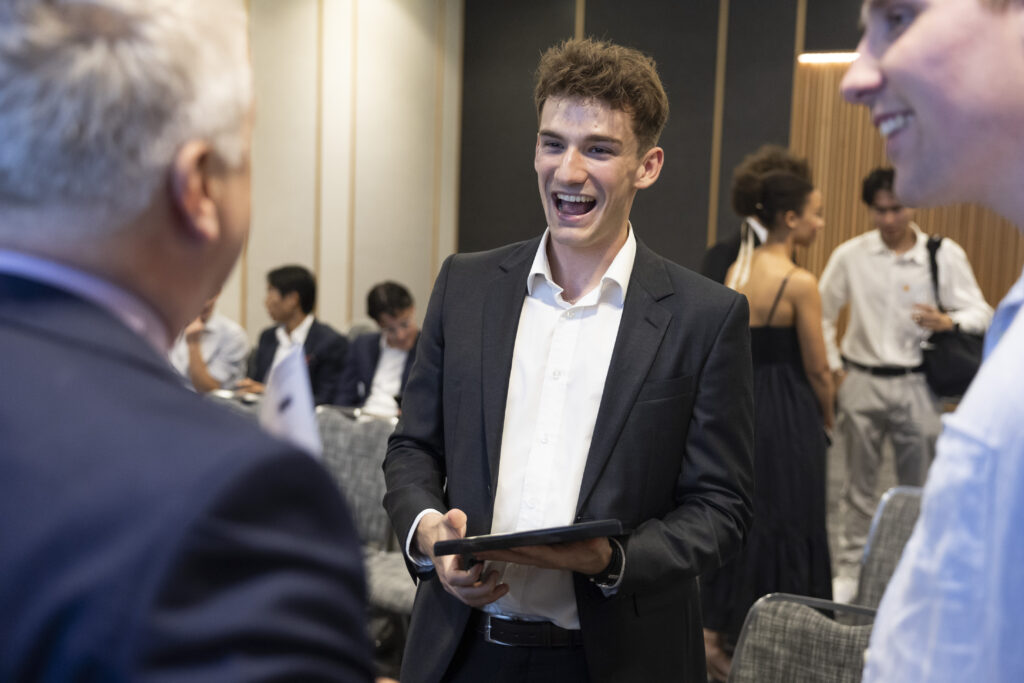
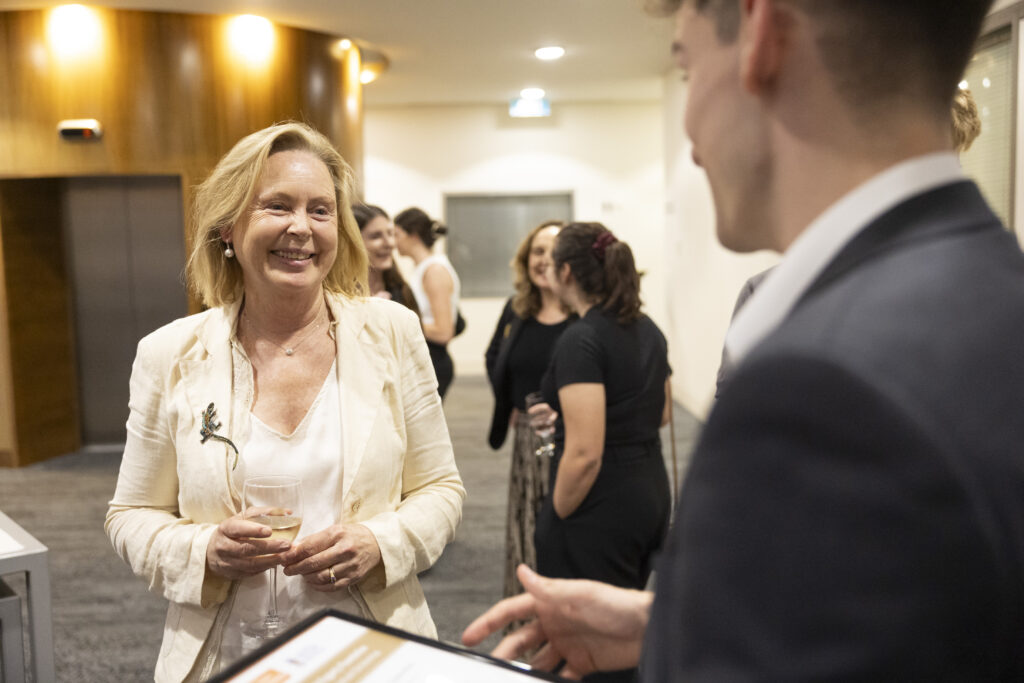
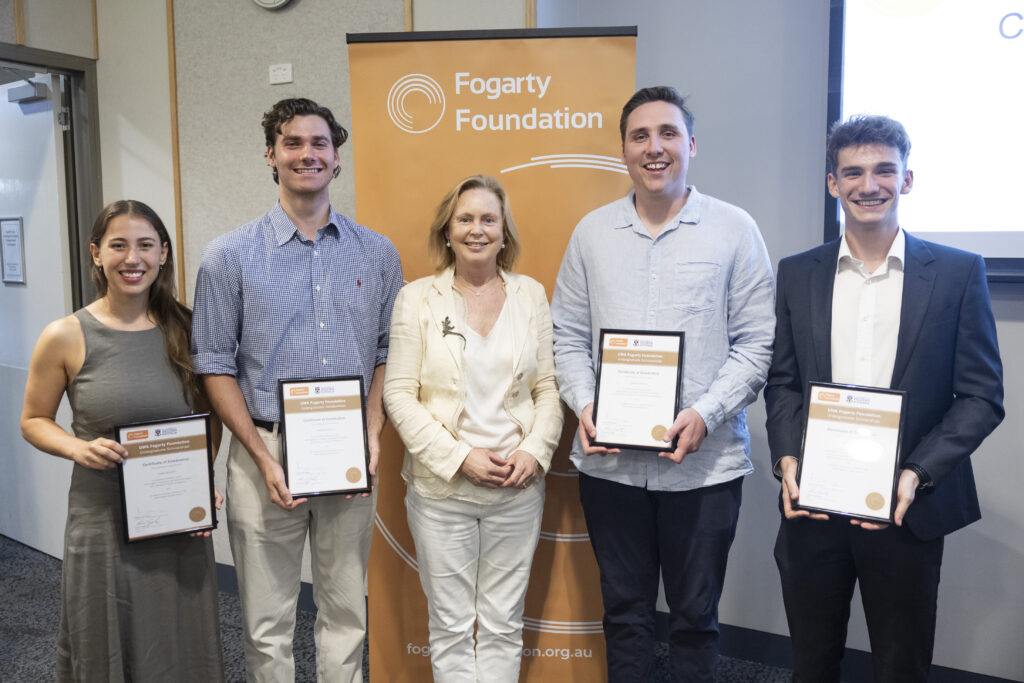
The celebratory breakfast hosted by UWA and the Fogarty Foundation on 27 September champions all that has been achieved since the formation of the UWA Fogarty Scholarship Program in 2003.
A recording of the breakfast celebration is available here.
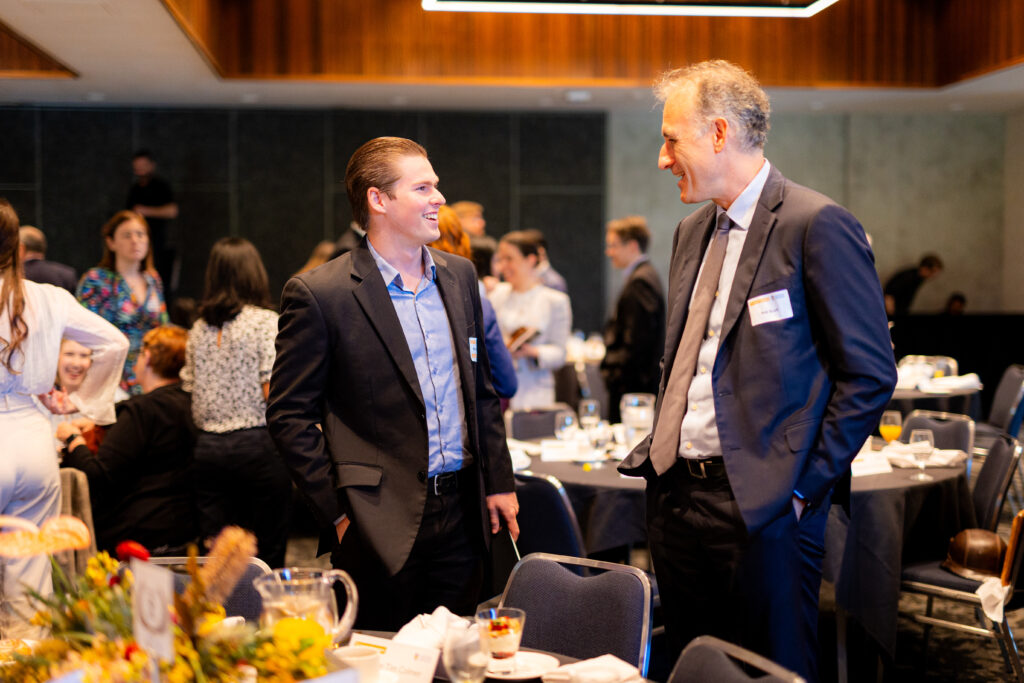
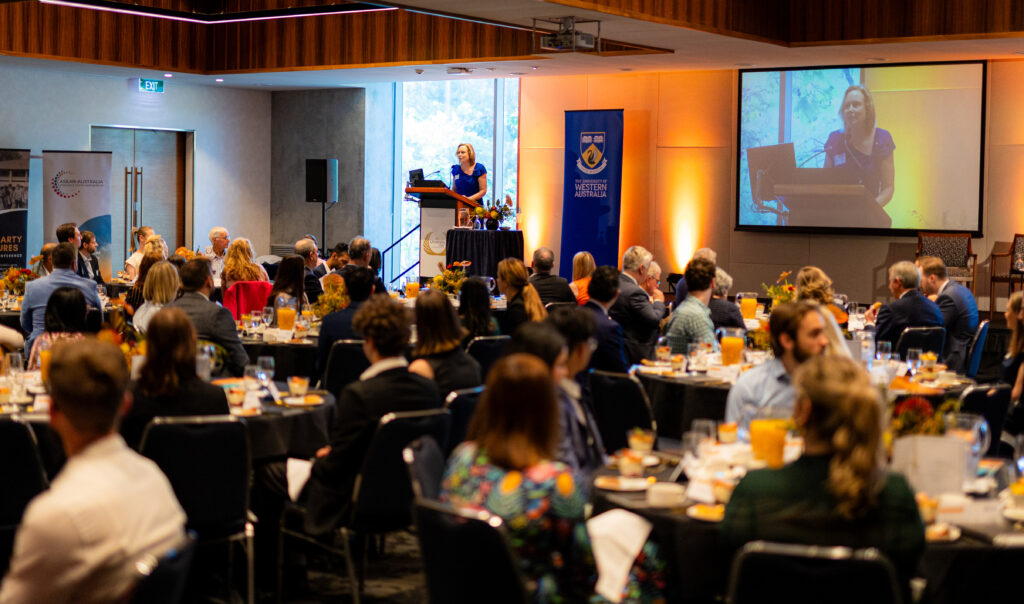
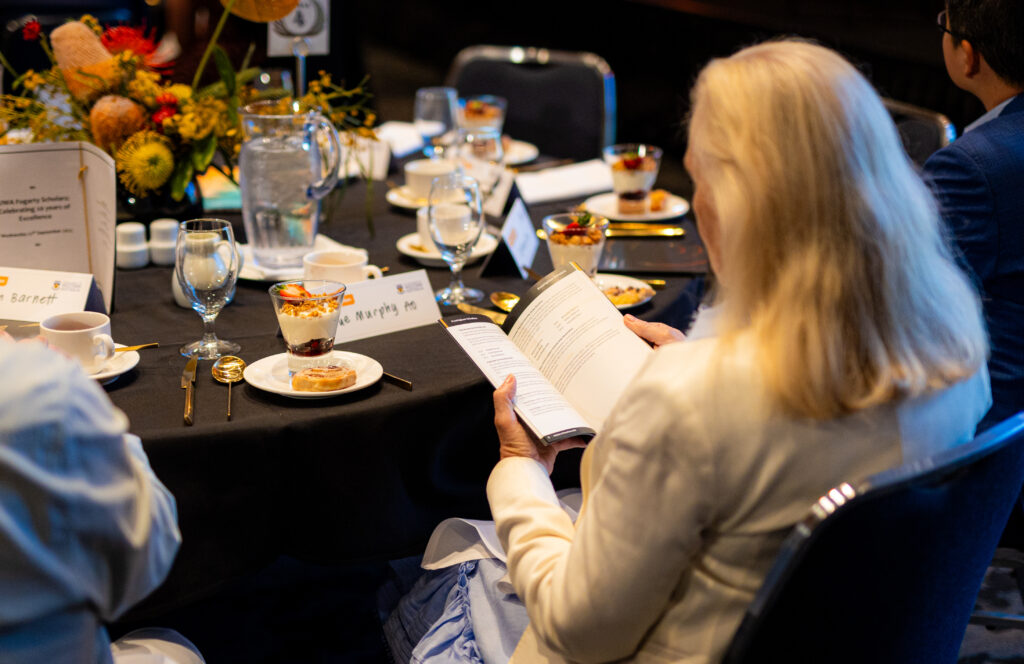
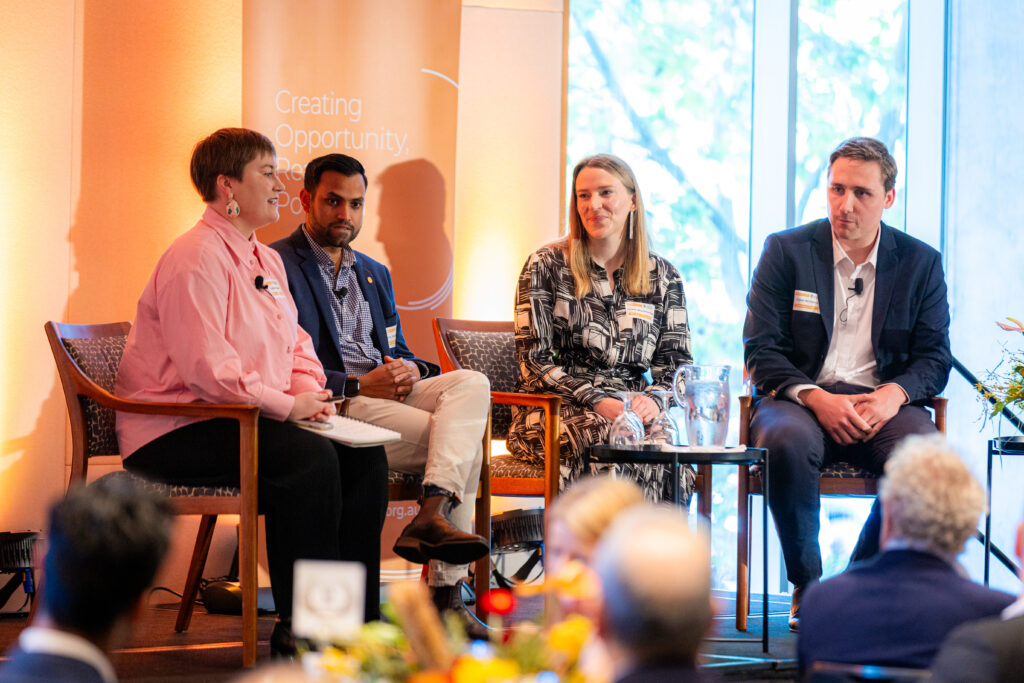
20 years ago, history was made with the commencement of a partnership between the Fogarty Foundation and the University of Western Australia to establish an elite scholarship program for high achieving young Western Australians; the first ever undergraduate scholarship of its kind in Australia. Fast-forward to September 2023 and we are delighted to be celebrating our current scholars, our alumni and our colleagues at UWA.
The celebratory event to mark 20 years of partnership as part of the Scholarship program championed all that has been achieved since its formation in 2003. Dr Annie Fogarty’s speech at the Breakfast gave the opportunity to reflect on the vast achievements of the Fogarty Foundation Scholars and alumni, which includes several global projects, initiatives, and partnerships.
Attendees enjoyed hearing from keynote speaker Rob Scott, Managing Director and CEO of Wesfarmers, reflecting on the importance of a lifelong love for learning, something which drives his passion to continue to grow and achieve.
This celebration was an opportunity for scholars, alumni, staff, and relevant professionals to reflect on the Fogarty Foundation Scholar programme; as well as look forward to further projects, initiatives and collaborations which may grow within this ever-expanding network of notable individuals. A quality seen in all our Scholars and alumni is the passion and drive to excel in their field and make a contribution to society. As the leaders of today – and tomorrow – we look forward to seeing the increasing impact they will make.
This celebration exemplifies the drive by the Fogarty Foundation to drive sustainable change by helping create a brighter future through education, leadership and raising aspirations.
We are grateful to the University of Western Australia for being such a wonderful partner over these two decades and congratulate all our Scholars, past and present, for their efforts and achievements. As the Foundation’s logo suggests, the change we ignite is a ripple, starting with the youth of today and continuing through strong leadership for tomorrow.
The UWA Fogarty Scholars Program has produced an impressive roster of alumni who are leaders in their fields. From doctors and engineers to entrepreneurs and educators, these scholars are making waves and driving positive change worldwide. Their accomplishments stand as a testament to the power of education, leadership, and community engagement.
We hope you made some new connections at our celebratory breakfast. Stay in touch with us through Facebook, LinkedIn and X; and you can also find all our amazing young leaders through our NEW scholar’s database. Please also enjoy our two latest films, one that promotes our Scholarship program and another that provides some insights into the paths of our alumni, which features six of our Scholars who are now living and working elsewhere in the world. Below is a photo gallery from the celebration breakfast.
Improving curriculum planning should be a national priority given the urgent challenges in Australian school education. This approach takes the lottery out of learning, because it guarantees that all students receive common, high- quality teaching that supports them to build knowledge and skills through their school years. The benefits of adopting a whole school curriculum can be significant. As one Serpentine Primary School literacy leader said “We don’t miss students. You know you’re not going to get students in Year 3 that can’t read. We have high expectations, we want all kids to be at grade level.” (page 25).
Tackling this problem will require action from school leaders and teachers, as well as governments, and Catholic and independent school sector leaders. Grattan’s 2022 report, Ending the lesson lottery: How to improve curriculum planning in schools, sets out what governments and sector leaders should do to help tackle this problem.
School leaders should not wait, however, for government action. The new Grattan Guide (insert link to PDF) sets out practical steps they can take now to establish an effective whole-school approach to curriculum planning.
The Guide draws on lessons Grattan learnt studying five schools across Australia that have embraced a whole-school approach to curriculum, the two of which from WA are both Fogarty EDvance schools – Serpentine Primary School and Aveley Secondary College.
The paper presents the six key features of a whole-school curriculum approach:
- A shared vision among school leaders and teachers.
- Shared, detailed, and sequenced curriculum plans and materials.
- An agreed approach to classroom instruction.
- A tiered model for supporting the learning of all students.
- Curriculum leadership roles and expertise.
- Ongoing professional learning and support for teachers.
This helpful report also provides links to materials prepared by other schools to help exemplify what this looks like in practice – and can provide a fast-track way to get started.
Grattan is also hosting an online event series with school leaders from two of the case study schools in our Guide. You can register for these events here:
- A conversation with Adam Bright and Brad Nguyen from Docklands Primary School, register here.
- A conversation with Stephen Pestana and Jarrad Stewart-Olsen from Aveley Secondary College, register here.
Annie Fogarty has been announced as the 2020 West Australian of the Year for her exceptional work in education advocacy.
Annie founded the Fogarty Foundation in 2000 to help advance education, support young people to reach their full potential and build stronger communities.
Under Annie’s leadership, the Foundation identifies areas of need, supports partner organisations with philanthropic funds, connections and knowledge, and develops initiatives that deliver educational opportunities, inspire community leadership and enrich lives.
Mrs Fogarty is also involved with several boards and committees to help foster innovation and creativity in young people, and is committed to ensuring excellent education and learning for all.
Each year, the Australian of the Year awards celebrate the achievements and contributions of eminent Australians by profiling leading citizens who are role models for us all.
Also receiving the prestigious award are fellow West Australians Professor John Newnham AM, a world-leading authority in modern obstetrics; Yarlalu Thomas, a medical student and Precision Public Health Fellow in genetic and rare diseases; and science educator (and Fogarty EDfutures Catalyst) Suzy Urbaniak.
Annie will join award recipients from all over Australia for the national awards ceremony at the National Arboretum in Canberra on 25 January 2020 – the 60th anniversary of the awards.
Congratulations Annie!!
How can we get the best education for our children? How can schools better support students to provide an environment that allows them to flourish, regardless of family, wealth and social disadvantage?
In this talk, Annie notes the essential role that education plays in society. She also argues that schools should function as a community hub whose role extends beyond simply teaching, as well as providing practical tips on how we all can get involved in improving our education system.
Watch Annie Fogarty’s TEDx talk in full here: Let’s create the educational village